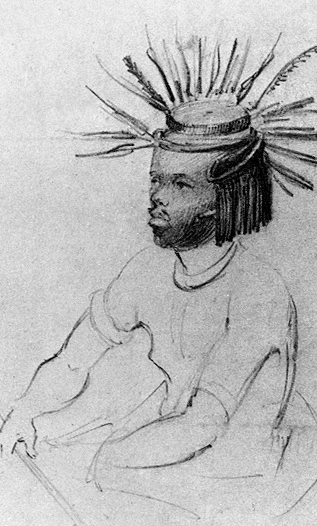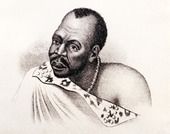Related Research Articles

Morganatic marriage, sometimes called a left-handed marriage, is a marriage between people of unequal social rank, which in the context of royalty or other inherited title prevents the principal's position or privileges being passed to the spouse, or any children born of the marriage. The concept is most prevalent in German-speaking territories and countries most influenced by the customs of the German-speaking realms.
An heir apparent is a person who is first in an order of succession and cannot be displaced from inheriting by the birth of another person. A person who is first in the current order of succession but could be displaced by the birth of a more eligible heir is known as heir presumptive.

The Thembu are Xhosa people who lived in the Thembu Kingdom. AbaThembu likely settled in their present-day region in the Eastern Cape around the 14th or 15th century. By this time, they had established themselves as a distinct group within the broader Nguni-speaking communities, with their own customs, governance, and identity.

Fils de France was the style and rank held by the sons of the kings and dauphins of France. A daughter was known as a fille de France.

The Mpondo People, or simply Ama-Mpondo, is a kingdom in what is now the Eastern Cape. It was established in 1224. The Ama-Mpondo Nation was first ruled by its founder who was King Mpondo kaNjanya who lived around and later the 'Ama-Nyawuza' clan, by nationality referred to themselves as 'Ama-Mpondo'. They are related to other Aba-Mbo kingdoms and chiefdoms in South Africa.
Iziduko (pl.) in Xhosa are family names that are considered more important than surnames among Xhosa people. Many Xhosa persons can trace their family history back to a specific male ancestor or stock. Mentioning the clan name of someone is the highest form of respect, and it is considered polite to enquire after someone's clan name on meeting. The clan name is also sometimes used as an exclamation by members of that clan.

Hintsa ka Khawuta, also known as Great or King Hintsa, was the king of the Xhosa Kingdom, founded by his ancestor, King Tshawe. He ruled from 1820 until his death in 1835. The kingdom at its peak, during his reign stretched from the Mbhashe River, south of Mthatha, to the Gamtoos River, in the Southern Cape.
King Palo kaTshiwo He was the king of the Ama-Xhosa Nation from 1728 until his death in 1755.

King Sarhili was the King of Xhosa nation from 1835 until his death in 1892 at Sholora, Bomvanaland. He was also known as "Kreli", and led the Xhosa armies in a series of frontier wars.
King Xolilizwe KaZwelidumile was the King of the Xhosa people from 10 April 1965 to 31 December 2005. King Xolilizwe was an active member of the National House of Traditional Leaders of South Africa. He was the oldest son of King Bungeni Zwelidumile Sigcawu.

The Nguni people are a linguistic cultural group of Bantu cattle herders who migrated from central Africa into Southern Africa, made up of ethnic groups formed from iron age and proto-agrarians, with offshoots in neighboring colonially-created countries in Southern Africa. Swazi people live in both South Africa and Eswatini, while Ndebele people live in both South Africa and Zimbabwe.
The Rharhabe House is the second senior house of the Xhosa Kingdom. Its royal palace is in the former Ciskei and its counterpart in the former Transkei is the Gcaleka, which is the great house of Phalo.
King (iKumkani) Maxhob'ayakhawuleza Sandile "Aa! Zanesizwe!" was the son of the late King Mxolisi Sandile "Aa! Bazindlovu", who was the son of King Archie Velile Sandile, and Queen Nolizwe, the daughter of Western Mpondoland King Victor Poto Ndamase "Aa! Bhekuzulu", and sister to both King Tutor Vulindlela Ndamase "Aa! Nyangelizwe" and the wife of Chief Thandathu Jongilizwe Mabandla of the AmaBhele aseTyhume royal clan. He was the 6th descendant of Sandile and 10th descendant of King Phalo, the Son of King Tshiwo.

The Gcaleka House is the Great house of the Xhosa Kingdom in what is now the Eastern Cape. Its royal palace is in the former Transkei and its counterpart in the former Ciskei is the Rharhabe, which is the right hand house of Phalo.

King Madzikane was the founder and a King of the amaBhaca nation. He was the son of the Zelemu King Khalimeshe kaWabana.
The Imidushane clan was founded by one of the greatest Xhosa warriors Prince Mdushane who was the eldest son of Prince Ndlambe, the son of King Rharhabe.

According to their own tradition, the Bomvana originate from the AmaNgwane people of KwaZulu-Natal. The AmaBomvana are descended from Nomafu, the first of the AmaNgwana tribe and from Bomvu, who gave rise to the AmaBomvu tribe. Bomvu's Great Son, Nyonemnyam, carried on the Bomvu dynasty. His son Njilo is the progenitor of the AmaBomvana. The AmaBomvana people left Natal in 1650 to settle in Pondoland after a dispute over cattle. After the death of Njilo’s wife, their grandson Dibandlela refused to send, in accordance with custom, the isizi cattle to his grandfather. This led to an open dispute. Dibandlela fled with his supporters and their cattle to settle in Pondoland

The Mpondomise people, also called Ama-Mpondomise, are a Xhosa-speaking people. Their traditional homeland has been in the contemporary era Eastern Cape province of South Africa, and during apartheid they were located both in the Ciskei and Transkei region. Like other separate Xhosa-speaking kingdoms such as Aba-Thembu and Ama-Mpondo, they speak Xhosa and are at times considered as part of the Xhosa people.
References
- ↑ Blignaut, Charl (2016). "Book review: Mda's living history" . Retrieved 19 November 2021.
- ↑ Flowah, Mbali. "REVIEW: Little Suns (2015) by Zakes Mda" . Retrieved 19 November 2021.
- ↑ Soga, John Henderson. "Amampondomise" (PDF). Cambridge.
- ↑ "High Court of South Africa" (PDF). www.derebus.org.za. 2018.
- ↑ Scheub, Harold (1996). The Tongue Is Fire: South African Storytellers and Apartheid. ISBN 9780299150945.
- ↑ South Africa: Eastern Cape High Court, Mthatha (2020). "King Phahlo Royal Family and Another v Molosi and Others (3501/2019)" (PDF). SAFLII.
- ↑ Bongela, Milisuthando (2016). "Beyoncé channels ghosts of black women past". Mail & Guardian. Retrieved 19 November 2021.
- ↑ Scheub, Harold (2009). Shadows: Deeper Into Story. ISBN 9781893311862.
- ↑ Little Suns. "Friday October 22, 1880" . Retrieved 19 November 2021.
- ↑ Mda, Zakes (2015). Little Suns. South Africa.: Penguin Random House.
- ↑ ZwelamInsight (5 March 2015). "King Mhlontlo – Freedom Warrior".